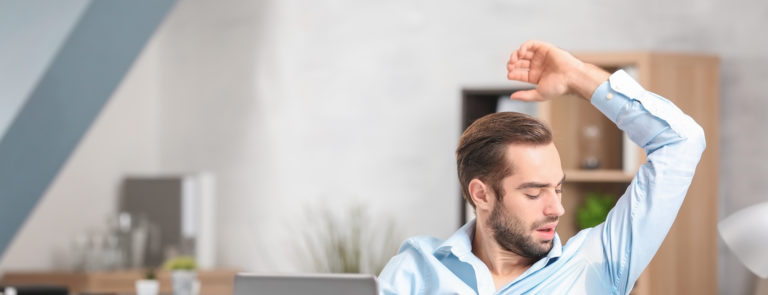15% off £20
Code:BAG
Why do I sweat so much?

Although sweating Is natural, sweating excessively can be concerning. Discover the different reasons that could cause excessive sweating and how to stop it
Sweaty armpits might not be the best of looks, but sweat actually plays an essential role in regulating the temperature of our bodies. Some people do naturally sweat a bit more than others, but how much is too much?
Excessive sweating could be the cause of an underlying health condition. Here, we’ll explore the reasons for sweating in different parts of the body, plus ways to help stop it.
But first, here’s some facts about sweating1
- Everyone has between two and five million sweat glands spread across their body
- Your body is always sweating, even if you don’t notice it2
- Used to exercise? You may find you start sweating sooner when you workout but don’t worry, that’s just because your body recognises that you need to cool down. So you can work out for longer
- Not everyone’s sweat is the same. Some people have a high salt content in their sweat. If your sweat stings your eyes or leaves white marks on your clothing, you’re a salty sweater
- During intense exercise in a warm climate, athletes can sweat off two to six percent of their body weight
The reasons for excessive sweating
While sweating more when you’re hot or doing exercise is completely normal, if you’re always sweaty you may have a condition called hyperhidrosis. But don’t worry, there are thing you can do to help with excessive sweating:3,4- Try to wear different shoes every day, leather ones are best
- Get some socks that will absorb moisture, and try to change them at least once a day
- Wear lose fitting clothes. Tight clothes will only increase the signs of sweating, and might even make you sweat more
- Apply antiperspirant before bed. It’s important to choose an antiperspirant rather than a deodorant, as these work by blocking the sweat ducts so the sweat can’t reach the surface of our skin. Deodorants simply mask the smell, but still allow a build-up of sweat
- Try to avoid wearing enclosed boots or sports shoes, as these may cause your feet to sweat more
- There are some things (e.g. drinking large amounts of alcohol and eating spicy food), which may make you sweat more, so you should avoid doing these as much as possible
- Avoid clothes made from nylon or any other tight, man-made fabrics















